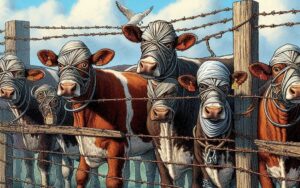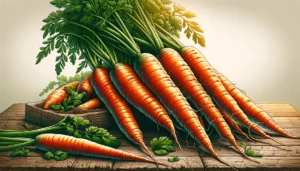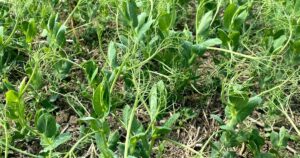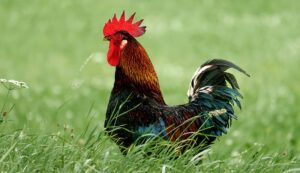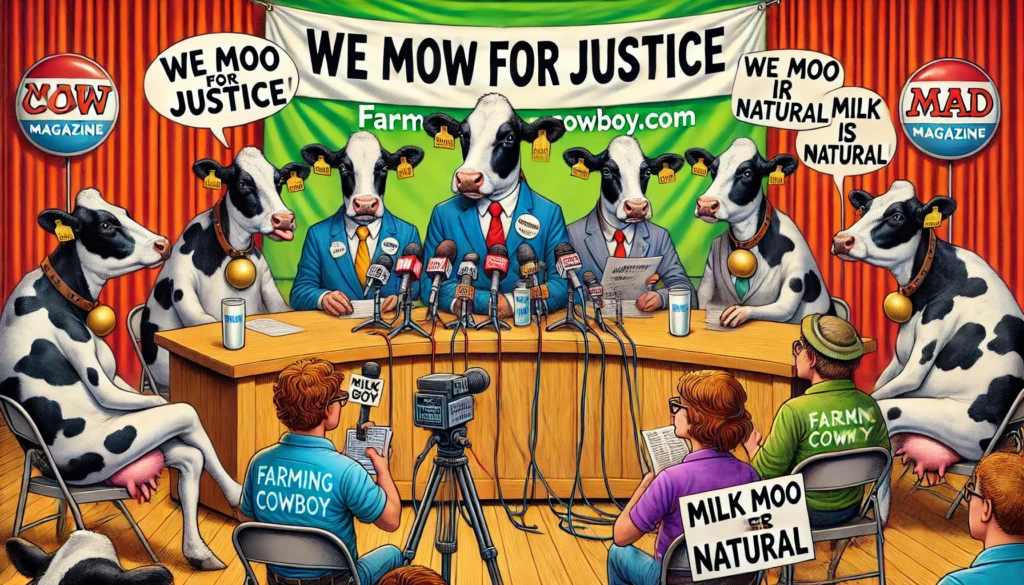
Dairy Farmer Dominates Olympics A satirical news conference scene where dairy cows are sitting at a table with microphones addressing the media. The cows are holding signs like We 7.webp.webp
Milk and Dairy: The New Performance-Enhancing Controversy in Sports
Elle Purrier St. Pierre now come under scrutiny for drinking milk…
In a bizarre twist that has left the world of athletics reeling, milk and dairy products have been thrust into the spotlight as potential performance-enhancing substances. The controversy erupted at the Paris Olympics, where dairy farmer and middle-distance runner Elle Purrier St. Pierre found herself at the center of a heated debate. Accusations of using milk as a performance enhancer have not only cast a shadow over her achievements but have also sparked an international dairy cows’ strike in protest of the allegations.
The Rise of Elle Purrier St. Pierre
Elle Purrier St. Pierre’s rise to fame is the stuff of legends. A dairy farmer from Vermont, she captured the world’s attention with her incredible running prowess and down-to-earth charm. Her success on the track, coupled with her humble beginnings, made her a fan favorite. However, her remarkable performances, particularly at the 2024 World Athletics Indoor Championships and the Paris Olympics, have now come under scrutiny.
The Allegations
The controversy began when Elle shattered records in Paris, winning gold in the 1500 meters and 3000 meters. Her victories were celebrated globally, but whispers of unfair advantages soon followed. Critics argued that her dairy-rich diet might be providing her with an edge, dubbing it the “Milk Miracle.” These claims suggested that the high intake of milk and other dairy products could be enhancing her muscle recovery and overall stamina, thus giving her an unfair advantage over her competitors.

Scientific Scrutiny
The allegations prompted a flurry of scientific investigations into the potential performance-enhancing properties of milk. Researchers focused on its components, such as calcium, protein, and other nutrients known to aid in muscle repair and endurance. While milk is indeed beneficial for recovery, the notion of it being a “magic potion” for athletes remains highly debatable. The consensus among nutritionists is that while milk can be a part of a balanced diet, attributing elite athletic performance solely to dairy consumption is far-fetched.
The Public Reaction
Public opinion has been divided. Fans of Elle Purrier St. Pierre have vehemently defended her, emphasizing her hard work and dedication. Social media has seen a wave of support for the athlete, with hashtags like #MilkIsNotADrug and #TeamElle trending worldwide. On the other hand, skeptics and competitors have called for stricter dietary regulations in sports, arguing that any potential advantage, no matter how small, should be scrutinized.

International Dairy Cows on Strike
In a turn of events that no one could have predicted, the controversy has even reached the bovine community. Dairy cows around the world have reportedly gone on strike, refusing to produce milk in protest of the allegations against their product. In what has been described as the first international bovine labor movement, cows from Vermont to New Zealand have united under the banner “Moo-vement for Fairness.”
The Bovines’ Stand
The cows’ strike has been both a source of humor and serious discussion. Farmers have reported their cows holding sit-ins and blocking milking stations. In a symbolic gesture, cows have been seen wearing protest signs and gathering in fields to express their solidarity with Elle. Social media is flooded with images and videos of these bovine protests, adding a surreal twist to the controversy.
The Athletes’ Response
Athletes from various disciplines have weighed in on the debate. Some have expressed support for Elle, highlighting the importance of a balanced diet that includes dairy. Others have called for more comprehensive guidelines on nutrition to ensure fair competition. Prominent athletes have emphasized that performance is a complex interplay of diet, training, and genetics, and isolating one factor like milk is overly simplistic.
The Role of Sports Governing Bodies
The International Olympic Committee (IOC) and other sports governing bodies have been thrust into the center of the controversy. They are now tasked with addressing the allegations and ensuring the integrity of the competition. The IOC has announced an investigation into the claims, although officials have stated that the likelihood of banning milk is minimal.

The Media Circus
The media has had a field day with the controversy. Headlines like “Milk-gate: The Dairy Scandal Rocking the Olympics” and “Udderly Unfair? The Milk Debate” have dominated news cycles. Satirical news outlets have also joined in, with pieces poking fun at the absurdity of the situation. The mix of serious debate and humorous takeaways has kept the public engaged and entertained.
The Bigger Picture
The controversy raises broader questions about nutrition and fairness in sports. As athletes continue to push the boundaries of human performance, the role of diet and supplementation will remain a critical topic. The “milk controversy” serves as a reminder that elite athletes often face scrutiny and challenges beyond their control.
The Path Forward
Elle Purrier St. Pierre continues to focus on her training and farm work, unfazed by the allegations. Her story has highlighted the importance of dedication and perseverance, regardless of the noise. As the debate rages on, one thing is clear: the athletic community must navigate these waters with fairness, transparency, and a touch of humor.
The international dairy cows’ strike may eventually come to an end, but the legacy of this unusual controversy will likely linger. Whether milk will ever be considered a performance-enhancing substance remains to be seen, but for now, athletes and cows alike are standing their ground.
15 Educational Observations Based on Milk and Dairy: The New Performance-Enhancing Controversy in Sports
- Milking the Competition: Athletes now worry if their opponents have had a secret dairy boost before the race.
- Cheese for Champions: Forget energy bars; it’s all about that pre-race cheese platter.
- Got Milk?: Athletes are now asked this question more seriously than ever before.
- Udderly Unfair: Some competitors are moo-tivated to complain about this new dairy dilemma.
- Calcium Conundrum: Who knew a glass of milk could cause such a stir in the sports world?
- Bovine Boost: Cows might be the new coaches, offering tips on how to milk every second.
- Dairy Doping: Athletes caught with milk mustaches at doping tests raise eyebrows.
- Butter Believe It: The idea that butter could enhance performance makes some athletes spread their toast with caution.
- Yogurt Yells: Competitors are spotted downing Greek yogurt for that extra edge.
- Cream of the Crop: The elite athletes are now seen as the cream of the crop, quite literally.
- Milking It: The phrase takes on a whole new meaning as athletes capitalize on their dairy diet.
- Cereal Killers: Breakfast becomes the most critical meal of the day, with a focus on milk-soaked cereals.
- Farm Fresh Feet: Athletes joke about getting their speed from fresh, farm-raised dairy.
- Moo-vement: A movement starts among athletes advocating for the health benefits of milk.
- Udderly Ridiculous: Critics call the controversy udderly ridiculous, but the debate rages on.
These observations capture the absurdity and humor surrounding the controversy of milk and dairy being considered performance-enhancing substances in sports.

Originally Published at FarmerCowboy.com
2024-08-08 14:36:38
Karl Hoffman is a distinguished agriculturalist with over four decades of experience in sustainable farming practices. He holds a Ph.D. in Agronomy from Cornell University and has made significant contributions as a professor at Iowa State University. Hoffman’s groundbreaking research on integrated pest management and soil health has revolutionized modern agriculture. As a respected farm journalist, his column “Field Notes with Karl Hoffman” and his blog “The Modern Farmer” provide insightful, practical advice to a global audience. Hoffman’s work with the USDA and the United Nations FAO has enhanced food security worldwide. His awards include the USDA’s Distinguished Service Award and the World Food Prize, reflecting his profound impact on agriculture and sustainability.
